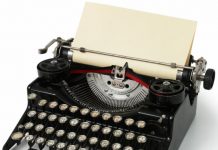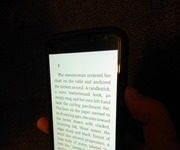 Book Riot’s wonderful ‘Reading Life’ feature has an essay this week responding to Woody Allen’s recent Golden Globes tribute. Kit Steinkellner writes about reading the media commentary the morning after, including a tweet from the son of Allen’s ex-wife Mia Farrow excoriating the GGs for paying tribute to an alleged child molester. From the article:
Book Riot’s wonderful ‘Reading Life’ feature has an essay this week responding to Woody Allen’s recent Golden Globes tribute. Kit Steinkellner writes about reading the media commentary the morning after, including a tweet from the son of Allen’s ex-wife Mia Farrow excoriating the GGs for paying tribute to an alleged child molester. From the article:
“A lot of response pieces to this story have asked the question “Can we despise Woody Allen the person and still cherish Woody Allen the artist? Can we hate the man but love his movies?”
Steinkellner, as much a book fan as a movie one, correctly points out that the movie world is not the only one whose historical annals are filled with less than savoury people. She cites J.D. Salinger and Orson Scott as examples. But the question remains a good one–can you love the work but hate the artist?
I have to come down, reluctantly, on the side of ‘yes’ thanks in large part to an experiment a college professor once did in a course I took, to make this very point. The course was a third-year seminar on ‘Post-Colonial Literature.’ As an upper-level class, the professor was allowed to choose the focus, and this professor, being South African, chose that. It was an expensive course because all the books had to shipped from the UK side of the publishing divide, but the chosen works were exceptional. This was the course which introduced me to Coetzee, who went on to win the Nobel Prize. Another book was a non-fiction title by a journalist who wrote about the unique reporting situation the Truth & Reconciliation Commission involved, where people’s life stories had to be condensed to sixty-second sound bites on the evening news, and where the overall story had been so all-encompassing that no reporter could be argued to be neutral.
Then, midway through the course, we read a novel which took on the ‘story’ of apartheid from the perspective of a young boy whose father was a policeman. All the brutality we had read about in the non-fiction accounts was filtered through the perspective of this young child whose father was complicit. The book was beautifully done, and we spent a week exploring it in class under the sensitive guidance of an excellent moderator.
And then, she dropped the bomb, after all the discussion was done; the author himself had come under fire in South Africa for his activities during apartheid. As a student, he had been approached by the secret police and asked to join several student groups at his university—and spy on them. He had done this. What did we think of the book now?
I was devastated. I felt tricked and betrayed. I felt like I had been asked to read (and buy!) a book by the South African equivalent of a Nazi, and I was incensed that she had not told us about it first. Her point was two-fold: number one, that even a ‘Nazi’ can still write an exceptional book, and whatever we learned from this book remains valid even in spite of the author’s personal background; and number two, that specifically relating to our discussion of the events in South Africa, we need to understand that everyone was complicit. This author was no ‘worse’ than anyone else in that regard.
So, there I had it. Did I still find the book a worthwhile read, even though the author repulsed me? Could I still find merit in the work of a person whose actions I found offensive?
I did the learn the lesson, but I never did read that book again, and if I had known of the author’s history first, I might have borrowed it instead of giving the author my money for a purchased copy.
Image licensed under Creative Commons by Colin Swan

































As a Daily Beast article effectively points out, making judgements about the actions of others is often affected by deliberate misinformation or information muddied by source or time. In Woody’s case, for instance, PR and unproven innuendo have seriously left doubt as to the offenders and victims of that story.
I try to avoid making conclusions about someone’s personal problems or failings, unless incontrovertible proof exists–and I’ve seen it. It’s too easy today to swallow bad PR and baseless accusations that get lambasted across the media, “so loud that it must be true.” And if it doesn’t happen to be the subject of which they write, does it really make a difference? Is Lovecraft’s horror negated by his racism?
Ultimately it’s up to the individual to decide whose voice is valid to them. I would only urge the individual to avoid jumping to conclusions without having all the facts.